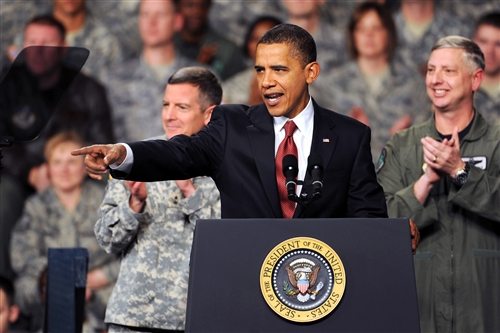By naming a new team Thursday to oversee the Afghanistan conflict, President Barack Obama could find it easier to extricate US troops from a grinding war where success has proved elusive.
Obama and his advisers famously clashed with the top brass and outgoing Defense Secretary Robert Gates over Afghan war strategy in 2009, with military commanders reluctant to back a troop withdrawal starting this July.
Now Gates is stepping down at the Pentagon, General David Petraeus is moving to the CIA from his job as commander in Kabul, and the military’s top officer, Admiral Mike Mullen, will finish his term in September.
In a tense internal debate that played out in the media, all three men resisted the idea backed by White House civilian advisers for setting a timeline for a troop pullout this year — until Obama overruled them.
“In the longer term, beyond this year, inevitably if you remove three of the four most prominent advocates from one position, in internal debate, you’re going to strengthen the other position,” Stephen Biddle, a senior fellow at the Council on Foreign Relations, told AFP.
The effect of a new team will not be felt for months, as Gates and top officers will remain in place to shape the decision on how many troops will be withdrawn in July, according to Biddle.
“The most important immediate decision about the conduct of the war is what the July 2011 drawdown is going to be,” he said.
Unlike Gates, the man named as the next Pentagon chief, outgoing CIA director Leon Panetta, is a savvy politico and longtime Democrat with much closer ties to the White House, where civilian aides worry about an open-ended mission with 100,000 troops on the ground.
“I think simply because he’s a party leader, he’s going to hear the voices of those in the Democratic Party who are uncomfortable with the Afghanistan strategy in a way that Gates (did not),” said Bruce Riedel, a former CIA officer who advised the White House on the war after Obama entered office.
Gates “was not on their calling card,” Riedel said.
As head of the Central Intelligence Agency, Panetta also has been exposed to a more skeptical view of the war effort, with intelligence reports questioning claims of progress by military officers.
US spy agencies in December offered a pessimistic assessment of the conflict, concluding in a National Intelligence Estimate that large swathes of Afghanistan remained vulnerable to the Taliban and that Pakistan still supported some Islamist insurgents.
Much of the military leadership has favored a long-term commitment to Afghanistan with large numbers of troops deployed, while White House advisers and many Democratic lawmakers are anxious to see a significant withdrawal underway soon.
But analysts said Obama’s choices for top military and diplomatic posts for Afghanistan did not necessarily represent a dramatic break in the nine-year-old war, and that no massive troop pullout was on the horizon.
“I think what the president has chosen to do here is to emphasize continuity rather than a significant change,” Riedel said.
Given the fragile progress on the ground and the political stance of Obama’s Republican opponents — who oppose any major withdrawal this year — sticking to the current approach made sense, he said.
In Washington journalist Bob Woodward’s book, “Obama’s War,” the president is portrayed as deeply frustrated with his generals, accusing them of pushing a troop surge in 2009 without offering a viable alternative.
“You have essentially given me one option,” the book quotes Obama as saying. “We’re not making Afghanistan a long-term protectorate.”
The White House deliberations ended with a compromise but the underlying disagreement about the war remains unsettled inside the administration, Biddle said.
“They’ve reached these uncomfortable compromises, but they both, I think, still believe that their original position is the right one,” he added.
“So I think the issues will be contentious for a long time to come, but the balance of power and contention will inevitably shift.”










